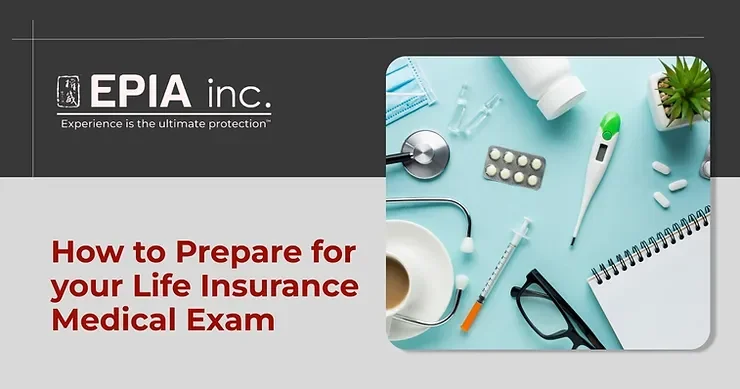Preparing for Your Life Insurance Medical Exam: A Complete Guide
The idea of setting up an appointment for a medical exam to apply for life insurance might seem daunting. However, a life insurance medical exam is typically quick, lasting between 15 to 45 minutes, and can be done at a convenient location. By adequately preparing for this exam, you increase your chances of securing the best life insurance rates.
Understanding the Life Insurance Medical Exam
A life insurance medical exam is a standard procedure in the application process where you undergo a brief medical assessment. The primary goal is to evaluate your overall health to determine the risk you pose to the insurer, which in turn affects your life insurance rates. The healthier and younger you are, the lower your premiums will be. Even if you consider yourself healthy, preparing for the exam can help ensure your results reflect your best health status.
Locations for the Exam
After submitting your life insurance application, a representative from a medical testing service like APPS or ExamOne will contact you to schedule your exam. You can usually choose from the following locations:
- Your Home: Offers convenience and comfort.
- Your Workplace: Convenient but might lack privacy.
- A Paramedical Service’s Exam Center: Ensures a controlled environment.
What to Expect During the Exam
Interview: The examiner will review the health questions you answered on your application and may ask for your physician’s contact details. Insurers verify the information you provide through various means.
Physical Exam: Expect to have your height, weight, pulse, and blood pressure recorded. You will also need to provide urine and blood samples. If you are over 50 and applying for a substantial life insurance policy (e.g., $1 million or more), you might need an electrocardiogram (EKG).
Measurements and Samples:
- Height and Weight: Used to calculate your body mass index (BMI).
- Blood Pressure: High blood pressure can indicate potential health issues.
- Blood and Urine Samples: Detect conditions like high cholesterol, diabetes, liver or kidney disorders, and the presence of nicotine or drugs.
- Possibly an Electrocardiogram (EKG): Required for older applicants or those seeking high coverage amounts, to detect heart conditions.
Preparing for the Exam
Weeks Leading Up to the Exam:
- Hydrate: Drinking plenty of water helps dilute sugar and protein levels and clears toxins.
- Reduce Salt Intake: High salt intake can concentrate your urine and lead to dehydration.
- Eat Healthily: Focus on whole grains, fruits, vegetables, and low-fat dairy products. Avoid processed foods high in sodium.
- Limit Alcohol: Moderate alcohol consumption (one drink per day for women, two for men) is advised to maintain healthy blood pressure.
Day Before the Exam:
- Avoid Alcohol and Nicotine: Both can increase blood pressure, and recent nicotine use will show up in tests.
- Skip Red Meat: It’s high in cholesterol.
- Avoid Certain Medications: Over-the-counter antihistamines and nasal decongestants can raise blood pressure.
- Get Plenty of Sleep: Less than six hours of sleep can elevate blood pressure.
Day of the Exam:
- Avoid Caffeine: Drinks like coffee, tea, and soda can increase blood pressure.
- Skip Strenuous Exercise: It can temporarily raise blood pressure.
- Stay Hydrated: Helps in providing blood and urine samples.
- Have Your ID Ready: A government-issued ID will be needed.
- Prepare Your Medical Information: List of medical conditions, treatments, medications, and physician contacts.
- Wear Appropriate Clothing: Short sleeves or easily rolled-up sleeves for the blood sample.
Getting Your Results
After the exam, the life insurance company will review your results. You may be able to access them online or through the company that performed the exam, such as ExamOne. Results are usually available within seven to 14 days.
What If Your Application Is Denied?
If your application is denied, request the specific reason in writing. Verify the results for data entry errors or false positives. If confirmed, address any health issues with your doctor before reapplying. Repeated denials can affect future life insurance applications, as the MIB Group keeps records of such instances.
Importance of the Life Insurance Medical Exam
The medical exam is crucial for several reasons:
- Risk Assessment: Helps the insurer evaluate your health and determine the risk you pose.
- Accurate Pricing: Ensures your premiums reflect your health status.
- Eligibility: Determines if you qualify for certain policies or coverage amounts.
- Financial Stability: Proper risk assessment helps the insurer remain financially stable and competitive.
- Fraud Prevention: Prevents applicants from lying about their health to get lower rates.
By following these preparation tips, you can ensure that your life insurance medical exam results reflect your best health, leading to potentially lower premiums and better policy options.



